#ChineseTrade
An Exhaustive List of Everything Automakers Want You to Know About Trump's Import Investigation (Hint: Higher Prices, Fewer Jobs)
It’s no secret that the automotive industry has come out universally against the Trump administration’s proposal to increase import tariffs. Numerous manufacturers weighed in independently on the issue as trade groups rise in opposition to the U.S. Commerce Department’s national security investigation.
The industry’s claim that imported vehicles don’t pose a risk to the wellbeing of the United States seems to have fallen on deaf ears. Threats that the prospective import duties on parts could result in fewer, more-expensive automobiles being produced domestically have been heard — and rebuked — by President Trump.
“What’s really going to happen is there’s going to be no tax,” he told Fox News in a weekend broadcast. “You know why? They’re going to build their cars in America. They’re going to make them here.”
However, automakers, parts suppliers, and even local governments have submitted comments to the Commerce Department ahead of the hearings scheduled for July 19th — and they’re all incredibly negative.
Trade War Watch: China to Reduce Import Tariffs for Cars and Components
China has announced plans to slash import fees on automobiles to 15 percent starting this July. While the tariff currently rides high at 25 percent, the country’s Ministry of Finance said reducing it was part of an intentional effort to open up China’s markets and spur development within the local automotive sector.
It may also have been part of a peace offering. President Donald Trump has been pretty clear on China’s trade policies with the United States, frequently referring to them as unfair. The U.S. imposes a svelte 2.5 percent fee on imported vehicles — unless we’re talking about trucks. “Does that sound like free or fair trade?” Trump tweeted last month. “No, it sounds like STUPID TRADE — going on for years!”
China Plans to Open Car Market By 2022
After weeks of unpleasant trade talk and posturing between Washington and Beijing, China’s lead economic planner announced the country would be easing limits on foreign ownership of automotive ventures. While an official metric was not posted, it will be less than the current 50-percent cap non-Chinese automakers have been limited to since 1994. But, for all we know, China may be seeking to scrap the mandate entirely.
We did, however, get a timeline. On Tuesday, the People’s Republic announced it would remove foreign ownership caps for companies making fully electric and plug-in hybrid vehicles this year — followed by commercial vehicle manufacturers in 2020 and the rest of the car market by 2022.


















Recent Comments